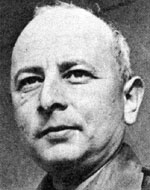Son of Yehuda and Gizela. He was born on September 11, 1928, in the city of Przemysl, Poland. His father, who was a descendant of a well-known rabbinic family and a philosophy doctor from the University in Vienna, was also the city’s chancellor and imbued with an enthusiastic Zionist spirit. Haim, who drew on this spirit from his parents, studied in an elementary school in Poland, and at the same time studied religious and Hebrew studies in the afternoons. Upon completing his elementary school he continued his studies in a secondary school in Russia, to which his family was deported by the Germans. This period in which he lived in suffering and wandering, left him with a stamp that gave his letters afterwards. His conclusion was simple and clear: the Land of Israel. At the end of the war he returned with the survivors to Poland and immediately joined a Zionist youth movement, which with its members emigrated to Israel. But when he approached his shores, he was imprisoned in Cyprus with his comrades in the movement and in his wish. While in Cyprus, he joined the ranks of the Palmach, and one of them came to Israel, where the War of Independence found him a combatant in the ranks of the Palmach. Immediately after the war, he was sent to the officers’ school, which he successfully completed, and then decided to tie his years with the IDF.There was not a religious person in his adult life, but his education at home, which brought generations of rabbis to bear, left him stamped. The embodiment of the Jewish man who sees human life as a correction of the world of the Holy One, blessed be He, whose order has somehow been disrupted and that redemption can not come until it is corrected – and this correction begins with Adam himself. Among the builders and founders of this soldier, the special spirit of life, the sense of humor and joy of life on the one hand, and hard and strenuous work, Who was not a member of the army’s top brass, and was sent to the Command and Staff School in 1959 and completed his studies there with complete success and was considered one of the best in his class. When he returned to Israel, he again immersed himself in the work, with his eyes mainly on the combat doctrine of the Armored Corps, and he was among the corps experts in the field of armored patrols, during which time he suffered from his severe illness, but no one would surrender. Despite his growing illness, Haim continued to progress in his profession – and in the outbreak of the Six-Day War he served as chief of staff in the division of Major General Arik Sharon. This role was conveyed to him, believing that despite his severe illness, he would be able to fulfill this task of gravity and responsibility successfully. As soon as the Six-Day War ended, he was awarded the rank of colonel. Despite his mental strength, however, his body was unable to withstand the malignant disease that overwhelmed him on 12 July 1967. He left a wife, a son and a daughter. He was laid to rest in the military cemetery in Kiryat Shaul. Major General Arik Sharon wrote in his letter of condolence to Yehudit, his wife and his family: “I met Haim for a long time, but during the last half year, and especially when he served as deputy in the division headquarters during the Six Day War and the period before it, I discussed his qualities as a commander, as a friend and as a person, and I learned to appreciate and cherish him. During this period, in spite of his illness, he spared no effort and did all that was required of him – and much more than that – with courage, devotion and unswerving loyalty, stubbornness and boundless devotion. In the most difficult and fateful days he was near Yemini and part of his victory was great. “His memory was placed in a booklet that the local council issued to the memory of its fallen soldiers.
